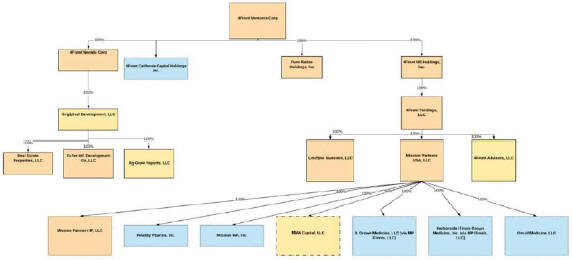In November of 2018, Michigan voters approved the Michigan Regulation and Taxations of Marihuana Act (“MRTMA”), which established a licensing and regulatory framework for adult-use growers, processors, secure transporters, retailers, microbusinesses, event organizers, designated consumption establishments, and safety compliance facilities. Recreational cannabis was legalized by ballot initiative, Proposition 1, in November 2018. The initiative mandates that the Michigan Department of Licensing and Regulatory Affairs (
) also known as the Marijuana Regulatory Agency (
), began accepting applications for retail stores December 2019. The initial application period is limited to existing medical cannabis license holders.
Proposition 1 allows adults 21 years of age and older to use cannabis recreationally and grow up to 12 plants, sets a 10-ounce limit for cannabis stored in residences (quantities over 2.5 ounces must be kept in a locked container), and establishes a state licensing system for cannabis businesses. A 10 percent tax is imposed on all cannabis sales, which are directed towards education, transportation infrastructure, and local governments. It also changes violations from crimes to civil infractions.
The Emergency Rules for Adult-Use Marijuana Establishments promulgated on July 3, 2019 allow a person to obtain equivalent licenses and – when those equivalent licenses have common ownership – to operate those equivalent licenses at the same location. On April 8, 2020, MRA issued an advisory bulletin regarding transfer of marijuana between equivalent licenses. Per the bulletin, beginning on December 1, 2019, MRA restricted certain transfers from/to growers, processors, and provisioning centers.
The MRA and State of Michigan attempted to combine the medical and adult-use markets during the 2019-2020 legislative session, but the proposed bill did not receive a vote in both legislative bodies. However, while the MMFLA and MRTMA remain separate and distinct laws, the MRA adopted topic-based Administrative Rules in June 2020 which address both medical facilities and adult-use establishments.
On September 27, 2021, the MRA held a public hearing to receive comments on updated Administrative Rules that are intended to provide clarity and consistency to licensees in both the medical and adult-use markets. Final drafts of the amended Administrative Rules were published in January 2022. There is no official date at this time for the updated Administrative Rules to become effective.
Under both the MMFLA and MRTMA Michigan municipalities can choose if they will allow cannabis establishments or facilities, and the type and number of establishments or facilities within their jurisdiction. This includes licensing and zoning ordinances for many municipalities. Because each municipality is able to devise a unique set of rules for cannabis licenses, each facility or establishment in a different Michigan municipality may be subject to a different set of local ordinances.
Any combination of a (a) grower, (b) processor, or (c) dispensary (
) may operate as separate cannabis facilities at the same location. Each license will be required to have separate entrances and exits, inventory, record keeping, and point of sale operations, if applicable. A cannabis facility operating at a same location under this rule with multiple state operating licenses may transfer cannabis product or money between facilities authorized to operate at the same location as long as certain conditions are met, including with regard to common ownership, an employee at each facility monitoring and executing transfers, manifests in the statewide monitoring system being created, and receipt of transfer being recorded in the statewide system.
The Department and the Board cannot limit the number of licenses issued. The number of licenses issued will be based on the local municipality which may limit the type and number of facilities authorized within its boundaries.
METRC is Michigan’s state-wide seed-to-sale cannabis tracking system that uses serialized tags attached to every plant and labels attached to wholesale packages to track cannabis inventory.
The following tests must be completed prior to product be sold: (a) Moisture content, (b) Potency analysis, (c) THC level, (d) THCa level, (e) CBD and CBDa levels, (f) Foreign matter inspection, (g) Microbial and mycotoxin screening, (h) Pesticides, (i) Chemical residue, (j) Fungicides, (k) Insecticides, (l) Heavy metals screening, (m) Residual solvents levels, (n) Terpene analysis, & (o) Water content.
Prior to a cannabis product being sold or transferred to or by a dispensary, the product must be labelled with the following information: name & license number of the producer and processor, unique identification number, date of harvest, name of strain, net weight, concentration of THC or CBD, activation time expressed in words or through a pictogram, name of testing facility, universal warning symbol, and all required warning language.


